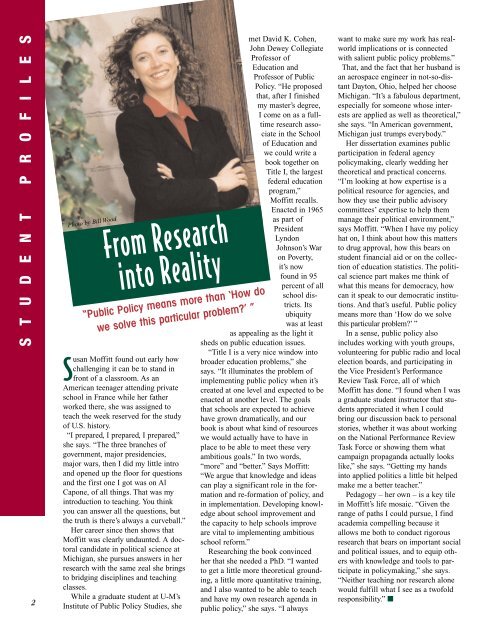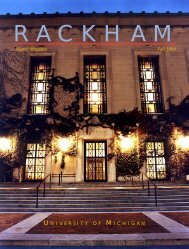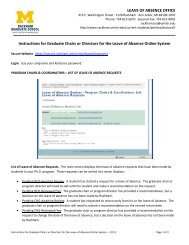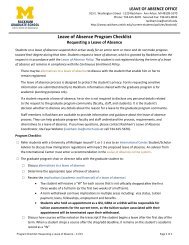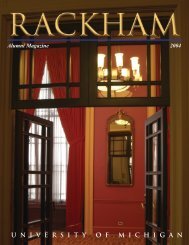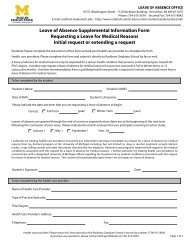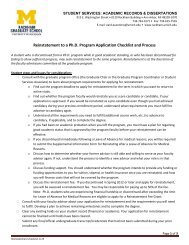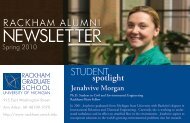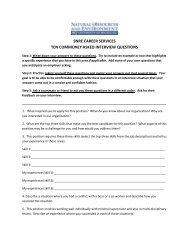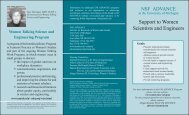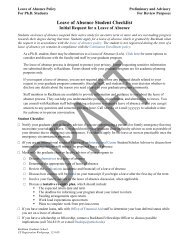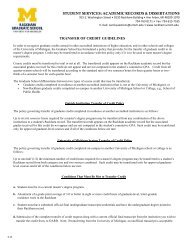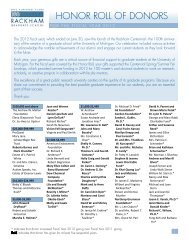Alumni Magazine 2001-2002 UNIVERSITYOFMICHIGAN - Rackham ...
Alumni Magazine 2001-2002 UNIVERSITYOFMICHIGAN - Rackham ...
Alumni Magazine 2001-2002 UNIVERSITYOFMICHIGAN - Rackham ...
You also want an ePaper? Increase the reach of your titles
YUMPU automatically turns print PDFs into web optimized ePapers that Google loves.
S T U D E N T P R O F I L E S<br />
2<br />
Photo by Bill Wood<br />
From Research<br />
into Reality<br />
“Public Policy means more than ‘How do<br />
we solve this particular problem’ ”<br />
Susan Moffitt found out early how<br />
challenging it can be to stand in<br />
front of a classroom. As an<br />
American teenager attending private<br />
school in France while her father<br />
worked there, she was assigned to<br />
teach the week reserved for the study<br />
of U.S. history.<br />
“I prepared, I prepared, I prepared,”<br />
she says. “The three branches of<br />
government, major presidencies,<br />
major wars, then I did my little intro<br />
and opened up the floor for questions<br />
and the first one I got was on Al<br />
Capone, of all things. That was my<br />
introduction to teaching. You think<br />
you can answer all the questions, but<br />
the truth is there’s always a curveball.”<br />
Her career since then shows that<br />
Moffitt was clearly undaunted. A doctoral<br />
candidate in political science at<br />
Michigan, she pursues answers in her<br />
research with the same zeal she brings<br />
to bridging disciplines and teaching<br />
classes.<br />
While a graduate student at U-M’s<br />
Institute of Public Policy Studies, she<br />
met David K. Cohen,<br />
John Dewey Collegiate<br />
Professor of<br />
Education and<br />
Professor of Public<br />
Policy. “He proposed<br />
that, after I finished<br />
my master’s degree,<br />
I come on as a fulltime<br />
research associate<br />
in the School<br />
of Education and<br />
we could write a<br />
book together on<br />
Title I, the largest<br />
federal education<br />
program,”<br />
Moffitt recalls.<br />
Enacted in 1965<br />
as part of<br />
President<br />
Lyndon<br />
Johnson’s War<br />
on Poverty,<br />
it’s now<br />
found in 95<br />
percent of all<br />
school districts.<br />
Its<br />
ubiquity<br />
was at least<br />
as appealing as the light it<br />
sheds on public education issues.<br />
“Title I is a very nice window into<br />
broader education problems,” she<br />
says. “It illuminates the problem of<br />
implementing public policy when it’s<br />
created at one level and expected to be<br />
enacted at another level. The goals<br />
that schools are expected to achieve<br />
have grown dramatically, and our<br />
book is about what kind of resources<br />
we would actually have to have in<br />
place to be able to meet these very<br />
ambitious goals.” In two words,<br />
“more” and “better.” Says Moffitt:<br />
“We argue that knowledge and ideas<br />
can play a significant role in the formation<br />
and re-formation of policy, and<br />
in implementation. Developing knowledge<br />
about school improvement and<br />
the capacity to help schools improve<br />
are vital to implementing ambitious<br />
school reform.”<br />
Researching the book convinced<br />
her that she needed a PhD. “I wanted<br />
to get a little more theoretical grounding,<br />
a little more quantitative training,<br />
and I also wanted to be able to teach<br />
and have my own research agenda in<br />
public policy,” she says. “I always<br />
want to make sure my work has realworld<br />
implications or is connected<br />
with salient public policy problems.”<br />
That, and the fact that her husband is<br />
an aerospace engineer in not-so-distant<br />
Dayton, Ohio, helped her choose<br />
Michigan. “It’s a fabulous department,<br />
especially for someone whose interests<br />
are applied as well as theoretical,”<br />
she says. “In American government,<br />
Michigan just trumps everybody.”<br />
Her dissertation examines public<br />
participation in federal agency<br />
policymaking, clearly wedding her<br />
theoretical and practical concerns.<br />
“I’m looking at how expertise is a<br />
political resource for agencies, and<br />
how they use their public advisory<br />
committees’ expertise to help them<br />
manage their political environment,”<br />
says Moffitt. “When I have my policy<br />
hat on, I think about how this matters<br />
to drug approval, how this bears on<br />
student financial aid or on the collection<br />
of education statistics. The political<br />
science part makes me think of<br />
what this means for democracy, how<br />
can it speak to our democratic institutions.<br />
And that’s useful. Public policy<br />
means more than ‘How do we solve<br />
this particular problem’ ”<br />
In a sense, public policy also<br />
includes working with youth groups,<br />
volunteering for public radio and local<br />
election boards, and participating in<br />
the Vice President’s Performance<br />
Review Task Force, all of which<br />
Moffitt has done. “I found when I was<br />
a graduate student instructor that students<br />
appreciated it when I could<br />
bring our discussion back to personal<br />
stories, whether it was about working<br />
on the National Performance Review<br />
Task Force or showing them what<br />
campaign propaganda actually looks<br />
like,” she says. “Getting my hands<br />
into applied politics a little bit helped<br />
make me a better teacher.”<br />
Pedagogy – her own – is a key tile<br />
in Moffitt’s life mosaic. “Given the<br />
range of paths I could pursue, I find<br />
academia compelling because it<br />
allows me both to conduct rigorous<br />
research that bears on important social<br />
and political issues, and to equip others<br />
with knowledge and tools to participate<br />
in policymaking,” she says.<br />
“Neither teaching nor research alone<br />
would fulfill what I see as a twofold<br />
responsibility.” ■


